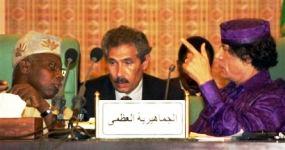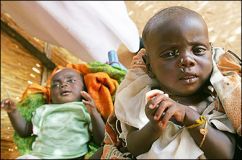US defends international pressure on Sudan to end Darfur crisis
WASHINGTON, Oct 18 (AFP) — The United States on Monday defended international pressure as a means to push Sudan into ending the crisis in its troubled western region of Darfur after the leaders of Sudan and four neighboring nations rejected non-African intervention in the situation.

|
|
Libyan leader Moammar Gadhafi, right, talks to Nigerian President Olusegun Obasanjo, left, during a meeting on Sudan’s Darfur region in Tripoli, Libya Sunday, Oct. 17, 2004. |
The State Department said Washington would welcome “any good faith effort” to resolve the humanitarian disaster in Darfur and shared the view that African nations should take a leading role in that but stressed that concerted non-African influence was one key to success.
“We welcome any good-faith effort to try to help improve the situation in Darfur and certainly we have no difference with those who emphasize the African role,” spokesman Richard Boucher said, noting US support for African Union monitors and troops now deployed in the region.
“We want to make sure that that role expands and we will work and support the African Union in doing that,” he told reporters, adding, however, that outside pressure, including the threat of UN sanctions against Khartoum, was also appropriate.

|
|
A twin Sudanese brother and sister wait to be attended by medical staff in September 2004 in an internally displaced persons camp. |
“We think that’s well justified by the tragedy of Darfur and that indeed has led to the kind of progress that we’ve seen,” Boucher said.
Earlier Monday in Tripoli, Sudan’s President Omar al-Beshir and the leaders of Libya, Chad, Egypt and Nigeria pledged to work the crisis at the African level in a bid to prevent such sanctions but said foreign intervention in Darfur was not welcome.
In a joint statement issued after the end of their mini-summit, they stressed their “rejection of all foreign intervention in this purely African question” and said sanctions would be counter-productive.
The 20-month-old civil war in Darfur has displaced 1.5 million people and spawned what the United Nations has termed the world’s worst ongoing humanitarian crisis.
The UN’s World Health Organisation recently charged that 70,000 civilians displaced by the Darfur conflict had died in camps from disease and malnutrition since March, a figure which Khartoum has disputed.
Khartoum has been accused of abetting massacres by its proxy militias and not doing enough to protect civilians, with the United States and some rights groups even talking of genocide.
In September, the UN Security Council threatened sanctions on Sudan’s vital oil industry if Khartoum failed to rapidly rein in the Janjaweed militias. The council has also called for international support for the African Union monitoring team and the rapid deployment of AU peacekeepers.
The AU has spearheaded international efforts to resolve the crisis and is in the process of deploying a 4,500-strong peacekeeping force from around five African countries to Sudan to oversee the peace process.
